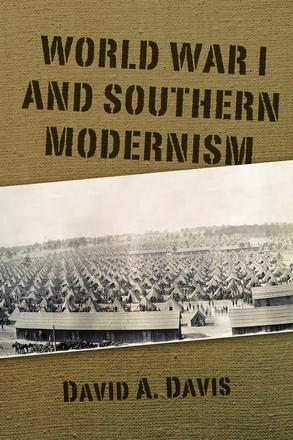
World War I and Southern Modernism
An exploration of the impact of the Great War on southern writing
Description
Winner of the 2018 Eudora Welty Prize
When the United States entered World War I, parts of the country had developed industries, urban cultures, and democratic political systems, but the South lagged behind, remaining an impoverished, agriculture region. Despite New South boosterism, the culture of the early twentieth-century South was comparatively artistically arid. Yet, southern writers dominated the literary marketplace by the 1920s and 1930s.
World War I brought southerners into contact with modernity before the South fully modernized. This shortfall created an inherent tension between the region's existing agricultural social structure and the processes of modernization, leading to distal modernism, a form of writing that combines elements of modernism to depict non-modern social structures. Critics have struggled to formulate explanations for the eruption of modern southern literature, sometimes called the Southern Renaissance.
Pinpointing World War I as the catalyst, David A. Davis argues southern modernism was not a self-generating outburst of writing, but a response to the disruptions modernity generated in the region. In World War I and Southern Modernism, Davis examines dozens of works of literature by writers, including William Faulkner, Ellen Glasgow, and Claude McKay, that depict the South during the war. Topics explored in the book include contact between the North and the South, southerners who served in combat, and the developing southern economy. Davis also provides a new lens for this argument, taking a closer look at African Americans in the military and changing gender roles.
Reviews
"World War I and Southern Modernism provides a valuable and multidisciplinary reassessment of the history of southern modernism and the ways modernity unevenly permeated the region, contributing to the scholarly conversation that reevaluates the role of modernity and the relationship between region and nation in the literature and history of the South. "
- Sydney Bufkin, Washington and Lee University, Journal of Southern History, Vol. LXXXV, No. 1, February 2019
"Lucidly written, grounded in a deep knowledge of its chosen period, and offering an ideal blend of historical narrative and jargon-free critical analysis, World War I and Southern Modernism sheds important new light on how the American crucible of 1917–18 changed southern life and southern literature. "
- Steven Trout, Flannery O’Conner Review
"World War I and Southern Modernism is a vital study for Southern Studies. . . . In all of his erudite discussions, Davis remains adept at demonstrating to his readers how the encroachment of modernity forced southerners to rethink the founding principles of race, gender and economy which the region held as the basis for its quotidian world."
- Michał Choiński, Polish Journal of American Studie
"[This volume is] a compelling revision of our understanding of the Southern Renaissance and a key contribution to the collective effort of a new generation of literary scholars to put World War I back at the center of American modernism, but this time getting it right."
- Keith Gandal, author of The Gun and the Pen: Hemingway, Fitzgerald, Faulkner and the Fiction of Mobilization and "War Isn't the Only Hell": A New Reading of World War I American Literature
"Davis shows us how the texts southern writers produced in the age of modernism were filtered through and filtered by the spirit of the age radiating from European capitals to distant places Parisians, Londoners, Viennese could often not imagine. The canonical authors are here (Faulkner leading the cohort) as well as some new recruits (Scott and Zelda Fitzgerald for example). This is an important addition to the work of Daniel Singal, Leigh Ann Duck, and others who have tried to assess 'the mind of the South' when the distance between that mind and the generators of the ideas it had to think about were as far apart from one another as they have ever been."
- Michael Kreyling, Gertrude Conaway Vanderbilt Professor Emeritus of English, Vanderbilt University